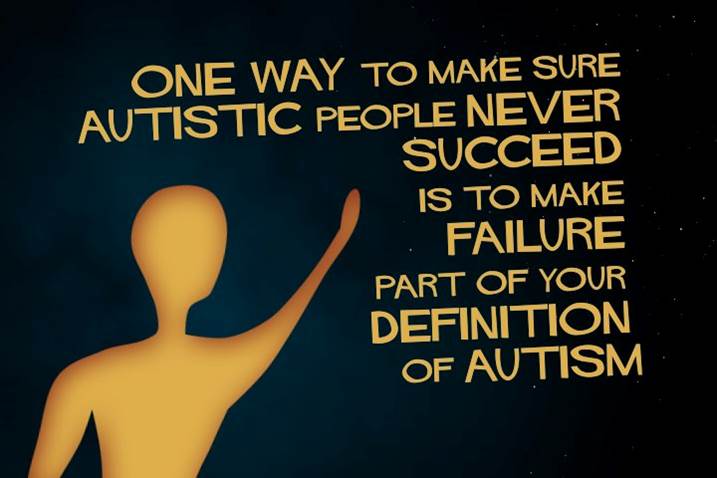The programme showcased Jo and JP, who had been aware that they were different all their lives (a sure pointer towards autism in my book) and who were wondering if they were autistic. There were two autistic women presenters, Georgia and Sam, and a non-autistic narrator, Anna.
I found it paradoxical that Anna, who explained her interest in autism as due to having an autistic nephew, could say categorically after hearing about Jo's difficulty with small talk "I have trouble with small talk and I'm not autistic" while at the same time claiming that for Jo, the only way to know for sure if she was autistic was to get a diagnosis.
Surely, if the only person who can tell if you are autistic is a clinician, it would also require a clinician to tell if you're not autistic. If self-identification as autistic is not regarded as definitive until confirmed by a clinician, then the same should apply to being non-autistic (especially perhaps if you have autistic family members since we know that autism runs in families).
We also know all autistic traits are human traits and there is no currently measurable biological marker for autism so essentially a diagnosis is the opinion of a clinician based on behaviour, self-reporting and family reporting. This makes it very susceptible to bias.
This programme, while supporting the diagnosis by Simon Baron Cohen (the originator of the discredited male brain theory of autism) as the arbiter of whether Jo and JP were autistic, also argued that more males were diagnosed because "females camouflage" their autism. Thus, whilst they acknowledged that autistic females are under-diagnosed, this was attributed not to the lack of expertise of diagnosticians, but rather blamed on autistic women, because we don’t present like autistic men.
For people who have always felt different in some way, identifying as autistic can be the gateway to self-understanding and finding the courage to be authentic rather than constantly trying to fit a mould of “normality”. Failing to get a diagnosis because you have managed to hide your differences or because you are female, can be a devastating blow*.
My concern is that people who "fail" the diagnostic test feel that they are “frauds” living in a no-man’s land; unable to function typically, but denied the possibility to claim and explore a condition which explains their difficulties.
Autism awareness is not evenly distributed throughout society and therefore many autistic people are without access to information that could transform their lives. In this situation formal diagnosis can be helpful - the artist Sonia Boue told me that her autism diagnosis was a positive turning point because it helped her leverage her strengths and recognise some of her challenges were due to her brain wiring rather than personal weaknesses. However just because something can be helpful does not make it optimal.
The idea that someone is only autistic if they are certified as such by a clinician is equivalent to saying you are only gay if a psychiatrist says so, that your own desires are not what determine your sexuality. In common with many other autistic people I believe that autism needs to be de-medicalised. Like homo-sexuality autism is a natural part of human diversity and needs to be recognised as such and identified by individuals, society and the medical profession rather listed in a psychiatric manual and diagnosed.
Of course autism can be identified by clinicians, in fact they need to be trained to recognise it because it affects the the way treatments for mental and physical conditions are best administered. This doesn’t mean they are appropriate gatekeepers to autistic identity. There is an autistic community, and like other communities we need to control our boundaries rather than have them defined by people with agendas and sensibilities that we might not feel aligned with.
* See “Adults’ Experience of an Asperger Syndrome Diagnosis Analysis of Its Emotional Meaning and Effect on Participants’ Lives” Trevor Powell DClinPsych, Louise Acker, BSc 2015 http://journals.sagepub.com/doi/abs/10.1177/1088357615588516

 RSS Feed
RSS Feed
